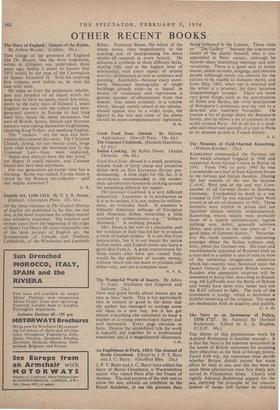J. P. T. BURY and J. C. Barry have edited
the diary of Bertie Greatheed, a Warwickshire squire who visited Paris after the- Treaty of Amiens. The real purpose of the visit was to allow his son, already an exhibitor in the Royal Academy, to see the pictures then being collected in the Louvre. These visits to " The Gallery " become the continuous resort of the diarist himself, who is dis- appointed in Paris society, although he records many interesting meetings and con- versations. There is a good deal of minor matter, about servants, lodgings, and obscure people (although rarely too obscure for the editors to be unable to footnote them), and from May, 1803, when war is renewed and the writer is a prisoner, his diary becomes disappointingly scrappy. There are some very good things, such as the conversation of Junot and Bai ere, the vivid descriptions of Bonaparte's audiences, and the visit to a deserted and waterless Versailles. He repeats a lot of gossip about the Bonaparte family, and he shows a lot of curiosity, in his walks around Paris. All in all his is a read- able and observant account of a visit to Paris at an unusual period in French history.
D. J.


































 Previous page
Previous page